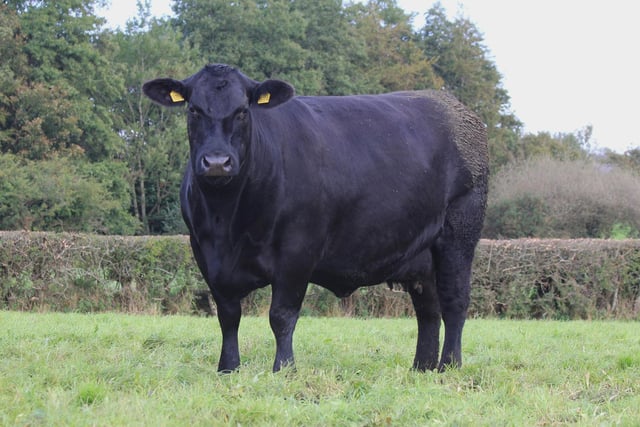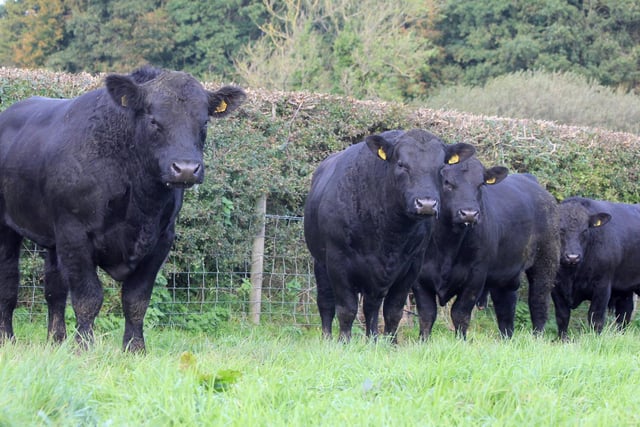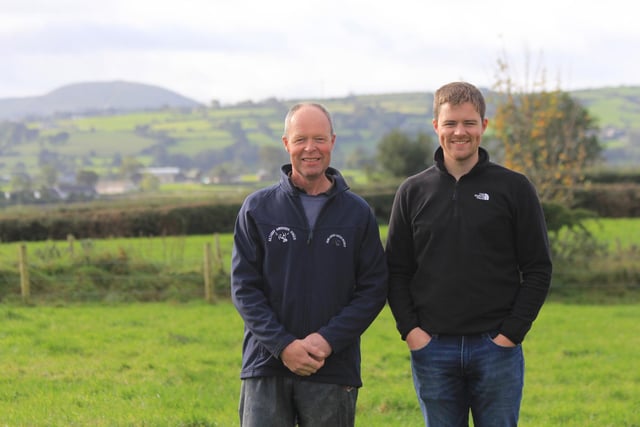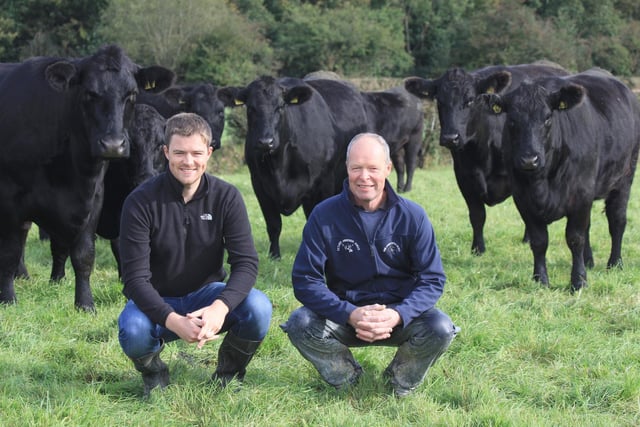Founded by Kenneth Bready in 1980 the County Down herd is renowned for producing top-quality bulls for the commercial dairy and suckler markets, and has sold a number of bulls to pedigree herds and AI, as well as exporting females as far afield as Portugal.
The picturesque Mourne Mountains and Slieve Croob form a backdrop for the Rathfriland-based farm. Third generation farmer Kenneth manages the 28.5 acre holding with help from son Steven. Both have full-time jobs, but are very passionate about good grassland management and the native Aberdeen-Angus breed.
Located in the townland of Kiltariff, meaning ‘Wood of Bulls’, the herd comprises 11 cows plus followers.
Foundation females included Edna E3 of Barnmeen purchased from neighbouring breeder Charlie Gracey; Lady Topsy 14th of Priestland and Dahlia of Priestland which originated from Sam McCollum’s at Bushmills in North Antrim. Additional females were sourced from John Gabbie’s Ballymaglave herd and Jim Scott’s Ardigon prefix.
The two main cow families, Lady T and Dahlia, hail from the females purchased from Priestland, and trace back through the breed society’s herd book to Lady Tause 18265 and Duchess of Westertown 927.
Kenneth and Steven put strong emphasis on breeding good square cows with a leg in every corner. “We like good-sized black cows weighing in excess of 800 kilos. They must have a broad top, a good rear end, sound feet and legs, and breed character,” explains Kenneth.
The herd’s breeding females are daughters of AI sires such as Netherton Americano M703, Shadwell Earl P773, Rawburn Fast Ball P844, Bosullow Elmark G209, Rawburn Boss Hogg N630 and O’Neill’s Black Bardolier.
AI sires are selected using proven bloodlines and conformation. “I never look at calving ease figures when selecting a bull,” adds Kenneth, who has used many of the ‘breed greats’ in his breeding programme over the years.
“Sires which have made a positive impact on our herd include Ankonian Elixir 100, Black Banner X1 of Idvies, Nightingale Regent R27, Ardrossan Admiral A2 and Belvin Patriarch 5’04.”
Kenneth attributes the consistency and success of the herd to high standards of stockmanship, coupled with a critical eye. “My philosophy over the years has been to ‘Breed the Best and Eat the Rest’,” he explains.
“I am very particular when it comes to selecting young females and bulls for rearing as herd replacements and prospective stock bulls.”
Animals that do not please Kenneth and Steven are sold for beef before they reach sixteen- months-of-age. “The beef bulls and heifers are easily fleshed without the need for excessive feeding, and are slaughtered at the local meat plant, ABP in Newry.”
The Kiltariff herd is spring calving and commercially managed on a grass-based system. Heifers calve into the herd at around 23 to 24 months old.
“Weather permitting, everything is calved outside. The cows are docile, and we keep a close eye on them coming up to calving. The breed is known for its easy calving ability, and the majority of our cows and heifers calve unassisted. We don’t own a calving aid, and only intervene if we think a cow is in difficulty,” adds Kenneth.
All newborn calves are weighed at birth, with accurate weights submitted at regular intervals to the Breedplan Scheme. The Bready family operate a closed herd policy and are accredited for Johnes and BVD under the CHeCS approved health scheme operated by the Agri-Food and Biosciences Institute at Hillsborough.
Calves are introduced to creep feed at four-months-old. “We use a 17% crude protein coarse ration which is fed twice per day. We feed a maximum of two kilos per head per day, rather than offering ad-lib concentrates,” adds Steven.
Weaning takes place when the calves reach nine to ten-months-of-age. Bulls and heifers are kept in separate groups. The cows are overwintered in a slatted cubicle shed and receive ad-lib round bale silage.
Young bulls are managed at grass during the grazing period which runs from April to October or November depending on the weather conditions Steven continues: “The bulls aren’t pushed and are coming through the Breedplan system with above average figures for growth, eye muscle and milk.”
Over the years Kiltariff bulls have been sold privately, and at society sales in Dungannon, to a number of pedigree herds, including Baronagh and Coltrim.
Two stock bulls have also been sold to the Greenmount Hill Farm operated by the College of Agriculture, Food and Rural Enterprise (CAFRE). More recently, young bulls have been sold privately to the Dartrey, Lisnavaragh, Ember, Magherally and Clogher Valley pedigree herds.
“We sell the majority of our bulls off-farm, mostly to repeat customers and on the recommendation of satisfied buyers,” adds Steven, who has also topped the Dungannon bull sale three times, achieving a herd best of 5,100gns for Kiltariff Dynamite N547 in February 2015.
The Kiltariff prefix has featured strongly over the years in the NI Aberdeen Angus Club’s annual herds inspection competition. In 2022 Kenneth and Steven won the award for the best medium herd.
Last year they also won a number of rosettes at the regional calf show, including first and second prizes in the intermediate bull calf class, and third prize in the intermediate heifer calf class. Their prize-winning trio were all sired by Tonley Jester Eric S318.
Kenneth has no plans to increase herd size. He is happy with his ‘select’ pedigree herd, and away from the farm is an active member of his local church and pipe band.

1. Kenneth Bready image 5.jpg
Kenneth and Steven put strong emphasis on breeding good square cows with a leg in every corner. Photo: freelance

2. Kenneth Bready image 1.jpg
Established over forty years ago the Kiltariff prefix is one of Northern Ireland’s most highly regarded and prolific Aberdeen-Angus herds. Photo: freelance

3. Kenneth Bready image 3 (1).jpg
Third generation farmer Kenneth manages the 28.5 acre holding with help from son Steven. Photo: freelance

4. Kenneth Bready image 2 (1).jpg
Third generation farmer Kenneth manages the 28.5 acre holding with help from son Steven. Photo: freelance